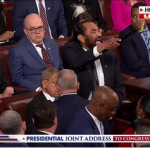How did Nigeria, a nation of over 200 million discerning souls, find itself hypnotized howbeit momentarily by the antics of a woman whose loyalty lies not with the green-white-green national flag but with the shadows of opportunism? What manner of sorcery allowed Natasha, a self-proclaimed emergency activist with the moral compass of a chameleon, to hijack the global stage at the Inter-Parliamentary Union (IPU), peddling fiction as fact and sabotage as advocacy? Is she truly a patriot or a foreign undercover spy on a deep espionage mission to destabilize Nigeria? Is she a megalomaniac on a rampage or a hired mercenary by powerful Northern political interests? The questions linger, unanswered yet deafening, as the National Intelligence Agency (NIA) and the Department of State Services (DSS) peel back the layers of her suspicious IPU appearance, unraveling a plot thicker than the Harmattan haze.
Born to a Ukrainian mother and Nigerian father, Natasha’s dual identity has long fueled suspicion. Her fluency in Russian and ambiguous allegiance to Nigeria now form the crux of a security dossier the DSS and NIA aim to decrypt. Could this woman, who claims to fight for Nigeria’s downtrodden, be a sleeper agent weaving webs of discord for foreign interests? Critics draw parallels to Mata Hari, the infamous World War I courtesan-spy whose theatrical charm and dual loyalties led to her execution by France in 1917 for double agency. Like Mata Hari, Natasha’s activism thrives on sensationalism and theatricality, using her platform to seduce global attention while obscuring her true allegiances. Yet the contrasts are stark: Mata Hari’s guilt remains historically contested, shrouded in wartime hysteria and misogyny, while Natasha’s inconsistencies including her staged victimhood, diplomatic sabotage, and fabricated evidence crumble under scrutiny. When she denounced Nigeria’s Senate President at the IPU, was she amplifying grassroots grievances or executing a foreign script to tarnish Nigeria’s image? The NIA and DSS are closing in.
Natasha’s latest claim that the Nigerian government seeks to arrest her upon her return from the US for attending the IPU Conference is another chapter in a career built on fabrication. Like Chicken Little, she squawks, “They want to arrest me,” another hollow cry in her theater of paranoia. Next, she may scream, “Hired assassins have been sent to kill me!” But as the Yoruba proverb warns, “The child who vows his mother will not sleep shall himself stay awake.” Natasha’s regime of fraud nears its end; her political elasticity, stretched thin by deceit, is snapping. She will soon learn that those who ride the back of the bus cannot steer it. Allies, sensing doom, will discard her like yam peels, for none follow a dancer who loses rhythm.
The silence of Natasha’s once-vocal supporters speaks volumes. Local groups that amplified her cries have erased her from their campaigns. Politicians who once weaponized her rhetoric for clout now label her a “loose cannon.” Former allies, who anointed her the face of modern activism, now murmur of her “bottomless appetite for chaos.” Even her social media army, once a roaring chorus, has dwindled to a whimper. Why? The truth disinfects like sunlight: Natasha is no revolutionary but a rogue artist painting masterpieces of misinformation. Her IPU stunt, intended to embarrass Nigeria, instead exposed her as a merchant of malice, her “evidence” dissolving under scrutiny like sugar in rain.
Natasha’s downfall is not tragedy but farce. She stormed into the public square, elbows akimbo and a truckload of vitriol, dishing out tempests of accusation, only to reveal herself as a gust of hot air, devoid of substance, lightning, or thunder. The NIA and DSS probe will likely expose her sponsors, but Nigerians already see the writing on the wall. Her name, once synonymous with “courage,” now elicits eye-rolls. A woman who weaponized marriage, manipulated media, and masqueraded as a martyr now faces the reckoning of irrelevance.
In the end, Natasha’s fate echoes a Yoruba proverb: “When a liar’s footing slips, not even the Iroko tree can halt the fall.” Let her cry that the sky is falling; Nigeria has moved on. A storm without thunder and lightning fades into silence, and the nation’s patience for charlatans has run dry.
Natasha’s legacy is another epic story. The court of public opinion, once seduced by spectacle, now demands substance. As dust settles on her empire of lies, one truth remains: a storm without thunder and lightning is mere noise. Nigeria has had enough Nasty Natasha.





